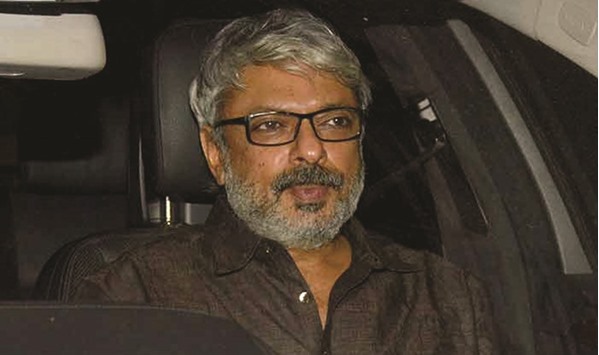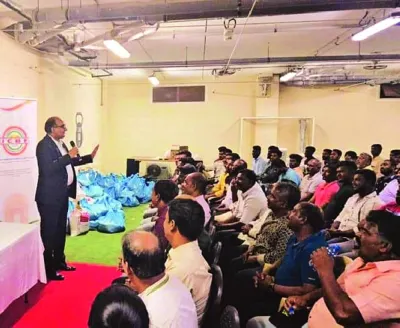Cinema in India has become the favourite whipping boy of just about everybody. Movies have for some years now been targeted by social activists, political organisations, religious groups and countless others – who view films as some sort of a punching bag that they can vent their frustration and anger against. But sadly, the cause of such rancour is misplaced, and has no basis whatsoever.
Any movie with the slightest flavour of Sri Lanka is a no-no in Tamil Nadu, whose people share an emotional bond with the Tamil-speaking community on the island nation. The animosity continues even when a film takes a neutral stand – as was the case with Prasanna Vithanage’s With You Without You, a poignant take on how a Sinhala pawn-broker wants to mend fences with the Tamils. Vithanage’s work had clearly showed how there was this genuine effort to heal wounds – inflicted on the Tamils during the 30-year civil strife in Sri Lanka.
Tamil actor Vijay’s movies have often landed in trouble with political groups – who found something to pick on. Kamal Hassan has had his share of misfortunes that once considerably delayed the release of one of his pictures.
Bollywood’s Karan Johar, Shahrukh Khan and Aamir Khan have faced virulent trolling in social media. Some of their films have been panned beyond belief. Johar’s Ae Dil Hai Mushkil was threatened with a ban by radical groups, which said that the movie by having on its cast the Pakistani actor, Fawad Khan, was unpatriotic.
Many years ago, Deepa Mehta and her cast of Nandita Das and Shabana Azmi had to literally stop her production of Water and flee from Benaras, when they were abused and told to quit by an extremist outfit which felt that the film showed India in poor light and was against the country’s culture. Water was a story of the widows of Vrindavan who lived in abject poverty, deprivation and suffering. This has been well documented in India, and the whole world knew about it. Yet, the outfit drove Mehta and her crew out of the sacred city. She later made Water in Sri Lanka.
Cut to the immediate present, and it is now the turn of Bollywood’s favourite boy, Sanjay Leela Bhansali. The other day at Jaipur, the national award winning helmer was slapped, beaten up and manhandled by members of the Right-wing Karni Sena – in the presence of his whole team – when he was shooting his historical movie, Padmavati (on the queen of Chittoor in Rajasthan, Padmini).
Bhansali’s work is set in the 13th century Rajasthan and talks about the attraction that Sultan Alauddin Khilji had for the queen, and the battle he fought at Mewar to try and take her.
The hardline Karni Sena was livid over a romance – historically untrue and reportedly presented through a dream sequence in the film – between a Hindu queen and a Muslim ruler. Bhansali has now packed and left with his team that included Ranveer Singh (playing Khilji) and Deepika Padukone (Padmini or Padmavati).
Every moviemaker, I think, has a right called artistic liberty. If he does not enjoy this, no director will be able to create anything. Europe has made dozens of films on Hitler, and the Jews have never protested. Ashutosh Gowarikar’s Jodha Akbar – a story about a Mughal ruler and a Hindu queen – could never have been made if the director had not taken some kind of licence to make his movie cinematically appealing. The list can be endless.
Unfortunately, India is becoming a terribly intolerant nation – where freedom of creative expression while being freely allowed by the Constitution, is questioned and threatened and smothered by fringe groups like the Karni Sena. These spread such fear that most artists are scared to be creative in a way they want to be.
More importantly, I abhor the duplicity of these rebellious men – who have no qualms about attacking helmer and writers, but keep mum when an actor as celebrated as Salman Khan goes scot free after shooting a blackbuck in the heart of Bishnoi territory in Rajasthan. The Bishnoi community holds the deer in great reverence. And Mr Khan has been making statements in court that sound like one huge joke. He said recently that the blackbuck had died of “natural causes”!
Incredulous, the people of Rajasthan have been keeping mum about Khan escaping a jail term (for blackbuck is an endangered species in India, and killing it is a criminal offence), let alone spearheading any protest against the actor’s misdemeanours, including his drunken driving that killed a Mumbai pavement dweller many, many years ago.
Asghar Farhadi to boycott Oscars
Last May at Cannes, actor George Clooney told a crowded press conference that there “would not be a President Donald Trump”. But he was wrong, and Trump unlike many other American Presidents, like, for instance, John F Kennedy, Bill Clinton, Ronald Reagan and even Barak Obama, has not been favoured by Hollywood. Not just this, but Trump now appears to be alienating the cinemas of many countries. The latest to declare that he will not attend the Oscar ceremony on February 26 is the renowned Iranian director, Asghar Farhadi – who has been, like several others, peeved over Trump’s move to stop people from some Islamic countries, including Iran, Iraq, Syria, Libya, Yemen, Sudan and Somalia, from entering the US.
Farhadi’s (who gave us brilliant films like About Elly, A Separation and The Past) The Salesman is one of the five movies nominated for the Foreign Language Oscar. A Separation won the Academy Award for Best Foreign Film in 2012.
The Salesman (at Cannes 2016 Competition) – whose title has been inspired by Arthur Miller’s classic play, “Death of a Salesman” – narrates the story of a young couple who plays the lead roles in a theatrical drama. Farhadi strays into Austrian helmer Michael Haneke’s (Funny Games, The White Ribbon, Amour) territory where the couple’s seemingly idyllic relationship faces a tempest after a series of misfortunes strike the two. The marriage suffers from nagging doubts, unrealistic expectations and a clash of values. Ultimately, the dilemma gets too suffocating.
Farhadi told the New York Times in a statement that he would not be part of the Oscar ceremony even if the US made an exception to just allow him in.
“I regret to announce via this statement that I have decided to not attend the Academy Awards Ceremony alongside my fellow members of the cinematic community,” his statement read. While he had originally considered attending, “The possibility of this presence being accompanied by ifs and buts, which are in no way acceptable to me even if exceptions were to be made for my trip,” the celebrity director said.
“To humiliate one nation with the pretext of guarding the security of another is not a new phenomenon in history and has always laid the groundwork for the creation of future divide and enmity. I hereby express my condemnation of the unjust conditions forced upon some of my compatriots and the citizens of the other six countries trying to legally enter the United States of America and hope that the current situation will not give rise to further divide between nations,” he added in what is seen as a scathing criticism of Trump’s new executive order banning citizens from seven nations coming over to the US.
In another incident, Hussein Hassan, the director of Reseba – The Dark Wind, has withdrawn his visa application to the USA. The movie – to be part of the Miami Film Festival – will however be screened, according to the Festival Director, Jaie Laplante.
Earlier, we had written in these columns that the lead actress of The Salesman, Taraneh Alidoosti, will boycott the Oscars.
*Gautaman Bhaskaran has been writing on Indian and world cinema for close to four decades, and may be e-mailed at [email protected]

Sanjay Leela Bhansali was slapped, beaten up and manhandled by members of the Right-wing Karni Sena, for a romantic scene in his upcoming movie between a Muslim ruler and a Hindu queen.


